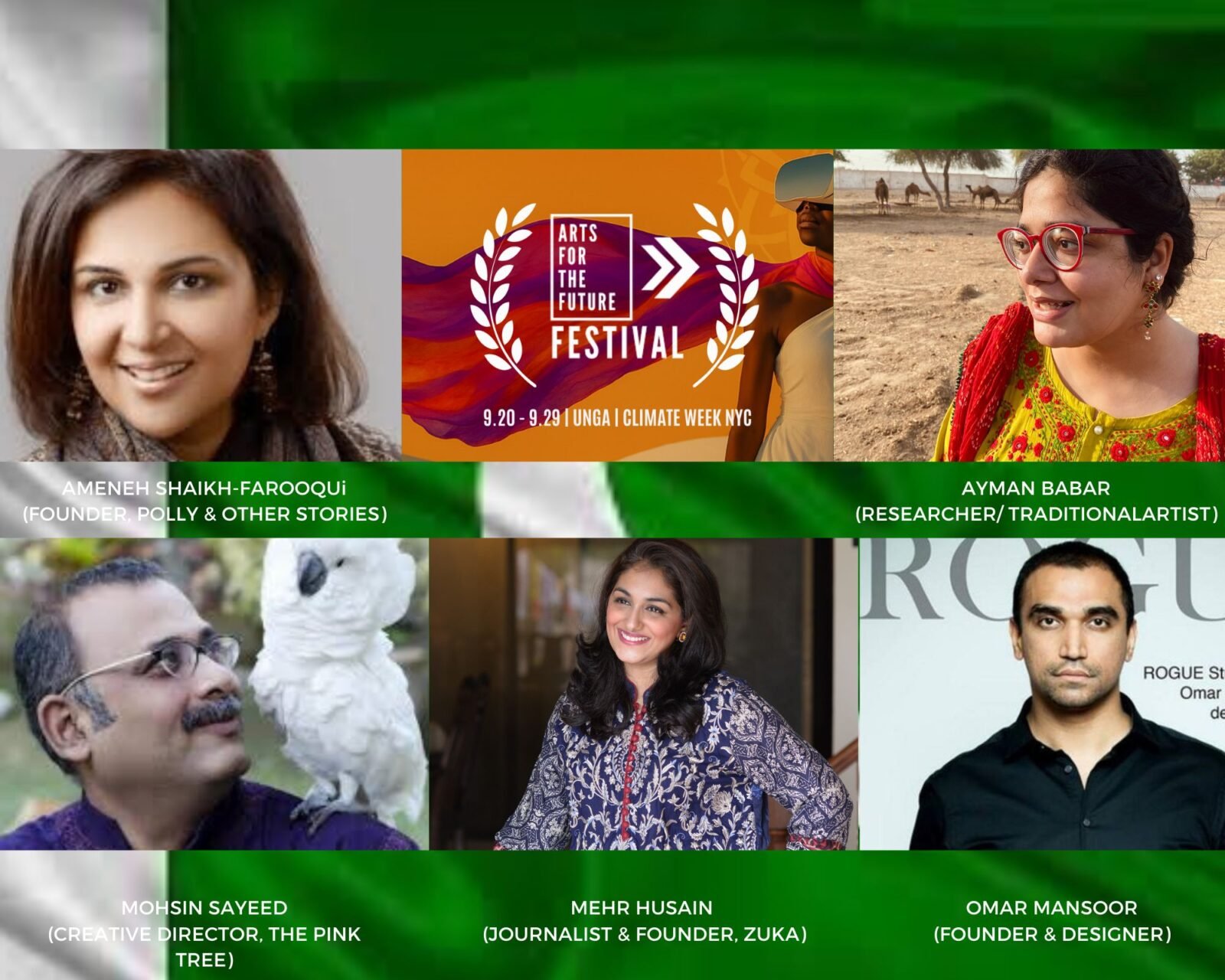
In what was a landmark moment for cultural and environmental advocacy, a distinguished panel of Pakistani experts, artisans, and heritage keepers called global attention to the urgent threats that climate change poses to Pakistan’s intangible cultural heritage. The panel, titled “Stitching Survival: Reclaiming Heritage and Climate Justice Through the Art of Displaced Pakistani Artisans,” was held as part of the Arts for the Future Festival, that is run alongside UN General Assembly 80 and Climate Week NYC.
The Arts for the Future Festival is founded and organised by Emmy winning filmmaker and UN Arts Curator Lisa Russell. It is an international gathering held alongside the United Nations General Assembly and Climate Week NYC. It brings together artists, activists, cultural leaders, policymakers, and citizens to explore how art, culture, and heritage are integral to envisioning and building just, resilient futures.

The panel explored how displacement caused by extreme floods, droughts, heatwaves, and other climate emergencies is eroding more than just landscapes — it is eroding traditions, oral histories, songs, textiles, crafts, and the ecological knowledge held by rural artisans in Pakistan.
The speakers included Amneh Shaikh-Farooqui, Chair and curator of the Women of the World (WOW) Festival in Pakistan and founder of Polly and Other Stories mapped the different waves Pakistan had seen including colonisation, industrialisation and now, indigenous-isation. Speaking from Karachi, she highlighted Pakistan’s role on the global stage in craftsmanship, focusing on the economic aspect of it.
“Pakistan is too often missing from the global creative economy but when we are left out, the world loses centuries of sustainable knowledge and artistry. Our artisans aren’t just makers; they are leaders, carrying cycles of sustainability that the world urgently needs. If we center their creativity as innovation, not charity, Pakistan can offer the blueprint for a truly ethical and sustainable global economy,” said Shaikh-Farooqui.
London based couture designer Omar Mansoor gave a deep insight on the rise of fast fashion and application of oil to clothing fuelling a clothes landfill crisis in the Global South. “It was an honor to speak at the festival that is related to UNGA and contribute to such a vital conversation. Fast fashion’s environmental toll, from water pollution to textile waste, is a crisis we can no longer afford to ignore. I hope our collective voices inspire urgent action and a shift toward more sustainable, ethical practices in the global fashion industry,” said Mansoor.
Karachi-based traditional artist with a background in social development and policy, Ayman Babar delivered a strong statement on the destruction of indigenous cotton crop in Pakistan.
“It was a pleasure to speak at the UNGA Arts for the Future Festival and bring Pakistan’s cotton story into the global conversation on fashion and sustainability. BT cotton, driven by corporate greed and enabled by weak regulation, has devastated our indigenous cotton seeds, displaced farming communities, and accelerated biodiversity loss. With more consumer clapback on polyester and a call for alternatives, the growing demand for natural fabrics risks repeating the same extractive models under the banner of ‘sustainable cotton.’ True sustainability must begin with seed sovereignty, protecting the seed, the soil, and the right of communities to grow and create on their own terms.”

Senior journalist and Creative Director of The Pink Tree Mohsin Sayeed ended the session with a powerful speech on how the future of the planet lay in the hands of rural communities as they were the legacy of ancient civilisations whose traditions, heritage, skills survived millenia. He highlighted that existing systems of capitalism and industrialisation had clearly not worked and there was a need to recognise new systems focusing on inclusivity needed to be implemented.
“To protect heritage is to protect the soil of memory. Art is not a luxury in crisis but in fact, it is a lifeline. Centering cultural knowledge and artisans in climate action is not just kindness. It is essential for sustainable futures and for that the Global North needs to learn to listen to us, not talk at us. We are inheritors of forms of living that have survived man-made and natural disasters. There is a truth to indigenous knowledge and their way of living that we simply cannot afford to ignore anymore. Indigenous communities need and should be listened to if humans want to survive,” said Sayeed.
Journalist and publisher Mehr Husain spoke about her village Shorkot located near Jhang and how that region was going through a humanitarian disaster due to the current floods. “When our lands are washed away, it is not only our homes that are lost but the songs, symbols, stitches, stories that carry our history and identity. This panel seeks not only to inform but to spark systemic shifts in how heritage, art, and climate policy intersect and reinforce one another,” said Husain.
The panel invited audiences to go beyond traditional notions of “cultural preservation” or “charity,” encouraging instead a vision of climate justice that centers those whose livelihoods and heritage are most at risk. As Sayeed said in his speech, what would it mean to treat artisans not as victims, but as custodians of futures?


